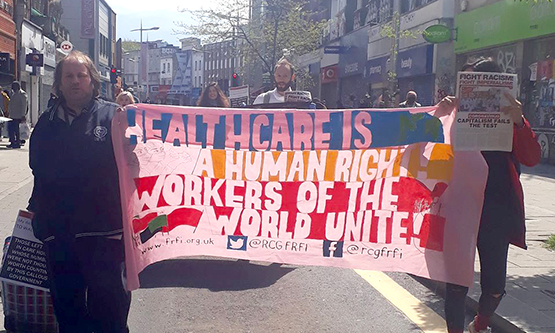
The coronavirus crisis has thrown up huge issues that overwhelmingly affect the working class in Britain. Anger over the appalling lack of Personal Protective Equipment for workers in hospitals and care homes surfaced early on during the lockdown. Official data showed clearly that the poorest sections of the working class – and in particular those from black and minority ethnic backgrounds – were being disproportionately affected by Covid-19. Most recently, we have seen the government shamelessly prioritise the needs of a profit-generating economy over the health of the working class. Throughout, the Revolutionary Communist Group has continued to go out on the streets – safely, socially distanced and absolutely legitimately even under emergency lockdown legislation – to ensure that we could offer a political alternative to the incompetence, callousness and greed of a failing capitalist system. We have held stalls in working class areas in London, Nottingham, Birmingham, Liverpool and Manchester; organised regular protests outside King’s College Hospital in south London and the Whittington in north London to coincide with the weekly ‘Clap for the NHS’ to demand PPE and decent pay for health workers, and marked International Workers’ Day with a socially distanced protest in solidarity with frontline workers. We have spoken to people outside hospitals, queuing at supermarkets and working at bus depots about their fear and growing anger at the way the government has handled the crisis.
We have done this not only because of the need to combat the mendacious refrain of both the government and abject ‘opposition’ that somehow, in a time of national crisis, we are ‘all in this together’ and that class antagonisms are therefore irrelevant, but also because the RCG knows the only way you can defend democratic rights is by exercising them. Despite harassment by police, or hospital security staff, we have made it clear that political protest is a legitimate activity – and we have found only support and interest in the working class areas where we’ve been active. Interesting, therefore, to see that those who would attempt to close down that democratic space include a union that likes to pose as being ‘left wing’.
In an extraordinary exchange, Mark Serwotka, general secretary of the Public and Commercial Services union, doyen of left trade union leaders, laid into the Socialist Party for holding a stall outside an office block where PCS members work during the lockdown. That the stall was on a public highway, conformed entirely to lockdown regulations in force at the time (which allow people to engage in voluntary work if it could not be performed otherwise) was of no concern to Serwotka. Instead, he took it upon himself to police those regulations on behalf of the ruling class. That PCS members could pass by the stall in complete safety – as opposed to the conditions in which they might be working – was of no interest to him. Claiming the stall ‘increased the risk to those staff of catching the virus’ he repeated that the Socialist Party had ‘not responded to our demand that you do not repeat these unsafe activities that are increasing the risk to PCS members posed by the virus.’ By implication, Serwotka was not just demanding that Socialist Party members stop their stalls, but that they and all socialists abandon any public political activity during the lockdown – in other words, forego their democratic rights. ‘Labour lieutenants of the capitalist class’ was how Lenin described these sorts of trade union leaders. The description fits Serwotka to a T.
For more details of how to get involved in the RCG’s activities, see page 15.




